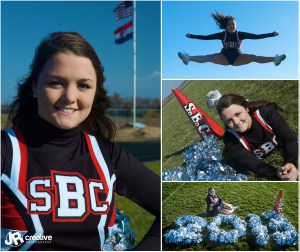
Let’s B-E-A-T Crohn’s
By Shannon Whitney
This story is featured in the Winter 2013 edition of myBoone Health magazine. Click here for a free subscription.
Kalani Hall, 17, had digestive issues on and off for years. She was told it was just anemia, but it felt worse than that. The mother of one of her cheerleading teammates works for Donald Gerhardt, MD, and helped Kalani make an appointment.
Dr. Gerhardt scheduled a colonoscopy, and in August 2011 diagnosed Kalani with Crohn’s disease. Crohn’s disease is an inflammatory bowel disease that tends to begin affecting people in their teens or twenties.
“I was scared. I had never really heard about it. I didn’t know if I was going to be OK, or what was going to happen,” said Kalani, now a senior at Southern Boone County High School.
At first, her treatment included iron infusions and other medications. She took 16 pills each day. Kalani and her family slowly began learning all about Crohn’s.
“She and her mom are very intelligent. They were receptive and followed what I explained to them,” said Dr. Gerhardt. “This family really helped her weigh the benefits and risks to each approach.”
Last spring, Dr. Gerhardt consulted with surgeon Walter Peters, MD. They decided the most irritated portion of her intestine needed to be removed.
Although she was scared, Dr. Peters was able to answer her questions and fully prepare her and her parents for the surgery.
“It relieved a lot of stress, because it was all new to me, and I didn’t know what was going to happen,” Kalani said. “It made it easier to understand because he had a picture and showed how the surgery was going to go and what he was going to cut out.”
She was a cheerleader and a student at Southern Boone County High School. She didn’t want this diagnosis to affect her teenage life.
“I was really worried about it because cheerleading means a lot to me, and not being able to do it would be devastating,” said Kalani. “When we went and consulted with Dr. Peters, I asked him if I’d be able to cheer. He said it would be OK after healing.”
Although she was supposed to wait three weeks before returning to physical activity, Kalani knew she couldn’t miss cheerleading tryouts. Two weeks after surgery she endured tryouts and made the team.
This fall, Kalani was the top fundraiser for the first Take Steps for Crohn’s and Colitis walk in Columbia. A group of her friends and family, including the cheerleading squad, joined in matching shirts for the walk.
Now she’s managing both her Crohn’s and her cheerleading. She hopes to study criminal investigation in college next year.
She shares this advice to other teens struggling with Crohn’s: “It does get easier. It will get easier. You can still live a normal life. You just have to manage it well.”